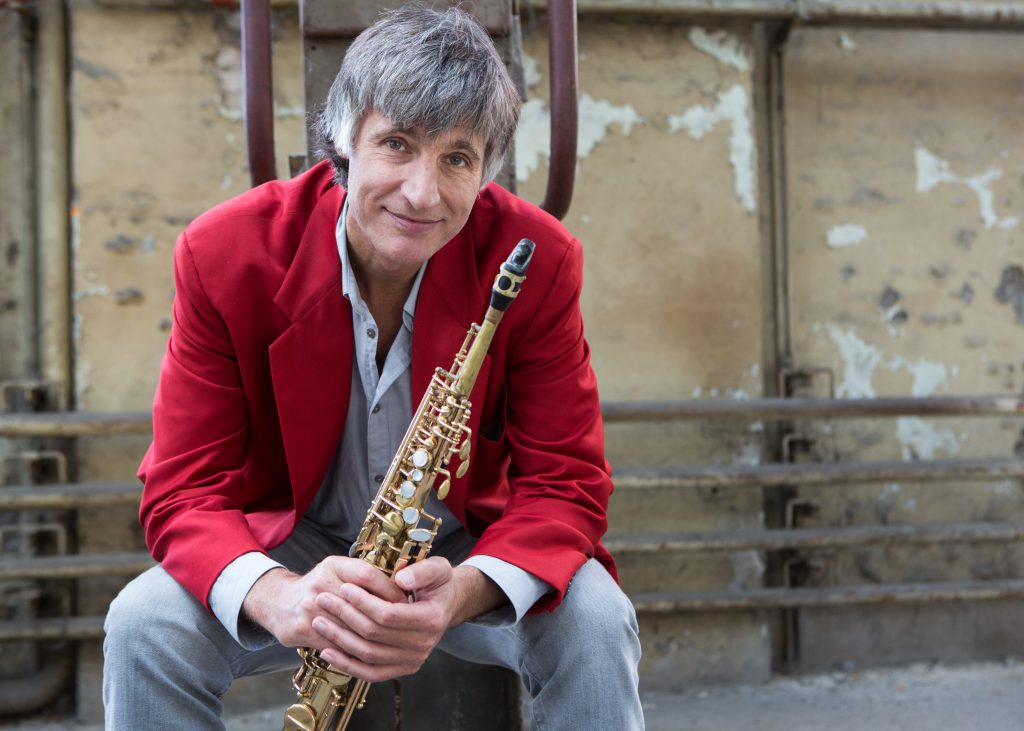Bargemusic’s Here and Now Festival opens with an evening of eclectic delights

Daniel Schnyder performing selections from his opera, “Charlie Parker’s Yardbird,” was a highlight of opening night at the Here and Now Labor Day Festival on the Brooklyn waterfront.
For twelve years the Here and Now Labor Day Festival has been informally ending the summer classical music season in New York and ushering in the fall. Informal is also the ideal description of Here and Now, which has a relaxed feeling to it — the stakes are low, and the point is not to impress but for musicians and audience to enjoy the music-making together.
This year’s festival at Bargemusic in Brooklyn opened Friday night with even more geniality than usual, and though the level of the music was not as high as it has been the last few years, that in no way diminished the evening’s pleasure. The program was a mix of new — there were three world premieres — and recent chamber music that ran the stylistic gamut from neo-romanticism to jazz-based composing, with one fascinating bit of international flavor.
Opening the evening were two duos, both premieres: Gerard Schwarz’s Sonata for Violin and Piano and Shadow Harlequinade, by Peri Mauer, for cello and the rarely seen contrabass flute.
Schwarz’s son Julian joined Bargemusic’s artistic director, violinist Mark Peskanov, for the duo. Julian Schwarz described the three movements as each having “slow beginnings, with a lot of weird stuff in the middle … because it’s new music.”
Well, no. Neither is new music automatically weird nor was the sonata weird in any way. Rather, it was highly emotional, lyrical music, with expressive flights in the middle framed by brooding introductions and conclusions. Peskanov and Schwarz dug deep, and at its best the music had the plain-spoken, communicative passion of the best mid-20th century American music, but the final movement was turgid.
Mauer’s piece was highly fragmented, which was by design. But few of the ideas had the chance to fully present themselves before something new came along. The fragments were often too small, and though not fast the piece felt rushed. Joining cellist Timothy Leonard was flutist Lish Lindsey, who just could not produce the body of sound from the giant instrument that one hears from Ned McGowan or Claire Chase.
Shamisen player Yoko Reikano Kimura brought To the Victims of Cain for that instrument with pre-recorded audio. From Yoriaki Matsudaira, one of the leading Japanese composers of the previous century, this was the most abstract work on the program and also the most intriguing.
Set in three movements, with each built around a different scale from traditional Japanese music, the piece had Kimura playing graceful, carefully placed lines against audio that had a strong metrical pulse and etched rhythms. Each section ended with Kimura asking in Japanese (if one heard her soft-spoken introduction correctly) “Who are you?” This was punctuated by a response from the audio that sounded like a gunshot.
This was the one piece that maintained an objective distance from the audience, and the contrast between this and the more socially minded performances was a reminder of how affecting the ritual of a performance can be.
That made an excellent companion to the quasi-ramshackle concluding set from composer and woodwind player Daniel Schnyder. A superb player and a tremendously articulate composer, he played in duos and trios with Peskanov and bass trombonist David Taylor.
Schnyder announced the music from the stage, a grab-bag selection that included a habanera written for his father from his orchestral Parkour Musical — which he described as something he wanted to be “impossible to play” — and excerpts from his notable opera, Charlie Parker’s Yardbird. A standout moment was sweet and lovely music for Parker’s stay at the sanitarium in Camarillo, which Schnyder played on alto flute, accompanied by Taylor.
The music was played seriously and with equal good humor — as an interlude, Taylor debuted Peaceful Chieftain, an elegant, improvisatory work based on Dvorak’s Humoresque No. 7. The evening ended with Schnyder’s Handel in Harlem, played by the trio. His synthesis of classical phrases and structure with jazz syncopations and pulse was a terrific encapsulation both of his work and the experience of the concert as a whole.
The Here and Now Labor Day Festival continues through Sunday. bargemusic.org






